John Boorman’s 1967 film Point Blank begins with a bang. Two of them. Gunshots. With each shot, a title:
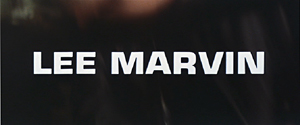
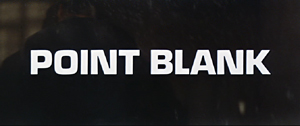
The target of the gunshots is a man named Walker (Lee Marvin). The shooter is Walker’s friend Mal Reese (John Vernon). Mal owes money to a shady group referred to only as “The Organization” and he’s enlisted Walker to help him knock off an underworld money drop so he can pay back his debts and save his own life. When the heist is pulled off successfully, Mal betrays his friend, shooting him and leaving him to die while running off with his $93,000 and also his wife Lynne. You don’t just shoot a character played by Lee Marvin, steal his wife and money and then expect to get away with it however.
Of course Walker somehow survives and later (how much later isn’t said though his hair is noticeably greyer) he’s approached by a mysterious man named Yost (Keenan Wynn) who says that Reese has used Walker’s money to buy his way back into The Organization and that he’s moving his way up the ranks. Yost says he’ll help Walker find Reese if Walker helps Yost bring The Organization down. Walker agrees and what follows is his quest climbing the organizational ladder, leaving a path of death and destruction in his wake as he extracts revenge for his friend’s betrayal.
That’s Point Blank in a nutshell, but if this was just a straightforward revenge tale, it might not be remembered so well today. Like the more popular (and equally violent) Bonnie and Clyde released the same year, Point Blank is kind of a bridge between European art cinema of the 60s and the so-called golden age of American cinema in the 70s. Employing a fractured, dreamlike, almost hallucinatory temporal structure marked by frequent flashbacks and jarring jumps in time, the first 20 minutes of the film especially would feel at home in a picture straight out of the French New Wave. This is more art film than action movie.
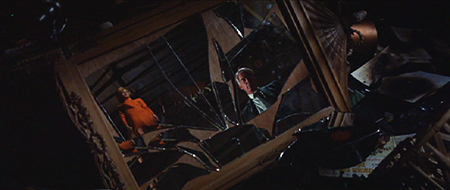
Holding Point Blank together and the force that carries it through some rocky narrative territory is an icy Lee Marvin as the single minded Walker. “Someone’s got to pay,” he says and to that end, he is absolutely ruthless. Every person he meets is either a barrier, a tool or the next step on his road to satisfaction. Time and again he glides into a dangerous situation like a specter of vengeance, seeks out his quarry, dispatches them and then moves along, armed with enough new information to lead him to his next target. Marvin pulls it all off with a bare minimum of dialogue relying instead on subtle expressions and gestures punctuated by sporadic bursts of unrestrained violence.
Also good is Angie Dickinson who brings her usual hard edged carnality to the role of Lynne’s sister Chris. She’s no femme fatale. She’s got a wounded, weary quality and she desperately seems to want to get through to Walker, to find the man inside the vengeance machine. Unfortunately, she’s just another means to an end; another step on the ladder.
John Vernon (in his film debut) is appropriately weaselly as the back stabbing Mal Reese. He’s tough when he’s holding the gun or he’s surrounded by weaklings, but he folds at the first sign of trouble.
Though it’s rooted in the simple crime thriller genre, Point Blank isn’t the kind of movie you’d expect from a major American studio in 1967. I admit the first time I saw it I was a little disappointed. I expected more of a tradition action picture in line with Marvin’s The Dirty Dozen, but this is not that movie and it’s a difficult one to warm up to. The first half can be confusing and the supremely stoic Walker is a hard character to like. There is action, but the violence often happens suddenly and unexpectedly. It’s not cathartic in that satisfyingly Dirty Harry kind of way where people are dispatched with a one-liner. Interestingly, many people die in the film, but never directly at the hands of Walker himself. He causes death without ever actually pulling the trigger.
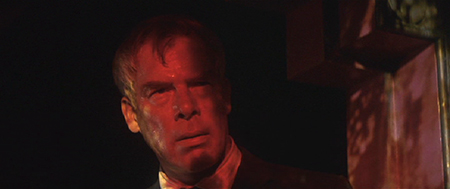
So, are all the artistic acrobatics simply empty stylistics or are they at the service of something bigger? With the dreamlike quality of the first part of the film, a popular question is whether Walker really survived the shooting that opens the film or if he is dying from his bullet wounds and the whole movie is something he imagines in the moments leading up to his death. It’s debatable, but I don’t think there is definitive evidence to suggest this is the case. More interesting to me is the idea that he survives, but his joy of living has been replaced by a thirst for vengeance. The sad thing is that the farther along he goes and the deeper he gets into The Organization, the farther he seems to get from what he wants. This is essentially a faceless corporation whose business happens to be illegal. This isn’t a world where the simple idea of an eye for an eye has any meaning and by the end of the film, Walker has ended up right back where he started, literally and figuratively. He’s alive physically, but he’s died spiritually.
However you answer the questions Point Blank presents, ultimately this is more of a film to be studied and debated after the fact than one to be enjoyed viscerally in the moment. If you’re in the mood for a straight up action movie you’d probably do well to look elsewhere, but if you’re at all interested in film history and you’d like to see an early American example of the creative exuberance that was revolutionizing cinema in Europe in the 60s, Point Blank is a must-see.
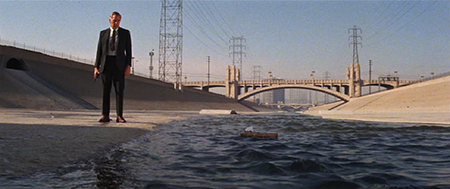
Point Blank. USA 1967. Directed by John Boorman. Written by Alexander Jacobs, David Newhouse and Rafe Newhouse. Based on a novel by Donald E. Westlake (writing as Richard Stark). Cinematography by Philip H. Lathrop. Music score composed by Johny Mandel. Edited by Henry Berman. Staring Lee Marvin, Angie Dickinson, John Vernon, Sharon Acker, Caroll O’Connor, Keenan Wynn, Lloyd Bochner and James B. Sikking. 1 hour 32 minutes. 4 stars (out of 5)
Glad to see you taking on an older movie 🙂 I still have to watch Point Blank, I caught the last twenty minutes once but I’ve never seen the whole thing.
I love this movie, it’s a crime thriller raised to the level of existential statement with an Kafkaesque streak to it as Walker keeps advancing up the ladder of the Company and never really getting anywhere until he just sort of melts away at the end.
You’re a bad man, Walker, a very, very BAD MAN.
Heh heh…love that scene. What makes it all work is that Marvin’s Walker is never smug or unstoppable, like most action heroes. He simply wants his money. He really, really wants his money, and he can’t understand why no one gets that.
Nice review, Craig.
I was planning to take a closer look at the opening 20 minutes of the movie, but collecting and touching up the image captures and the question of how to present them was eating up too much time. I might still do that in a day or two.
I’ll never forget the sound of Marvin walking through that airport. It’s interesting that Soderbergh contributed a commentary to the DVD, because The Limey certainly reminds one of Point Blank. Both films are wonderful.
Oh, it doesn’t sound like Marvin the clip because it’s NOT Marvin. Which is why they’re talking about Walker in the third person. Can I feed the rabbits, George?
I liked this movie the first time I saw it, but I had read up on it and was expecting an arty, “if Antonioni made an action film” sort of thing. Expectations are crucial in this case, especially if you’ve been exposed to the hype about it being one of the best “action movies” of the Sixties.
I agree that it’s that moot if he’s literally dead. It’s not a “big twist” sort of film.
How about Vernon’s demise? The special effect is dated, but the way it’s staged, it’s still a shocker. Whoops!
I’d love to see it on a big screen, and I hope you do get around to that more detailed analysis.
That’s a great scene Chuck and it’s one chunk of a whole great segment stretching from the opening gun shots to the point where Marvin shows up at the car lot looking for Stegman.
I watched The Limey again right afterwards and I might review it in a few days. What’s interesting is that Soderbergh acknowledges a huge debt to Point Blank on the Point Blank commentary, but then screenwriter Lem Dobbs denies a huge debt to Point Blank on The Limey commentary.
Lem seems to continue under the misapprehension that The Limey was his movie and not just his screenplay.
The Vernon death is awesome, perfectly fitting for the weasel, naked, helpless, accidentally falling to his death.
Funny thing is, I didn’t remember it as accidental the first time I saw it, I remebered Marvin pushing him over, but no. Marvin beats people up and is frequently the instrument of their deaths but he never kills anyone.
And you’re right about the non-twist Frank, though ***Spoiler*** the reveal that Yost and Fairfax are the same guy is twisty. Really makes you see Walker has gotten nowhere and accomplished nothing. My question is though, why does Fairfax tell James B. Sikking to leave the money? Was it really not money and just one more set up to kill Walker?
Great review. You know I am a philistine when it comes to old movies, nevertheless you write a compelling review. I think I have a man crush on you.
Ooh, if it’s really like the Limey, then I definitely should track it down. I love that film. I have a soft spot for Out of Sight, but if it weren’t for that one, the Limey would be my favorite Soderbergh (note: I still haven’t seen sex, lies, and videotape)
You’re too kind Peter. If I ever turn gay, Clooney will probably be first on my list, but when that doesn’t work out I’ll be giving you a call. In the mean time, get thee to a DVD player!
Be careful Hedwig with Limey expectations. That’s exactly how and why I approached Point Blank for the first time. Maybe I’m a little slow on the uptake, but I was wondering what all the fuss was about.
It would be heresy for me to say the Soderbergh film is better than the Boorman film, but goddamnit I enjoy it more. There’s an emotional component to it that I don’t get from Point Blank.